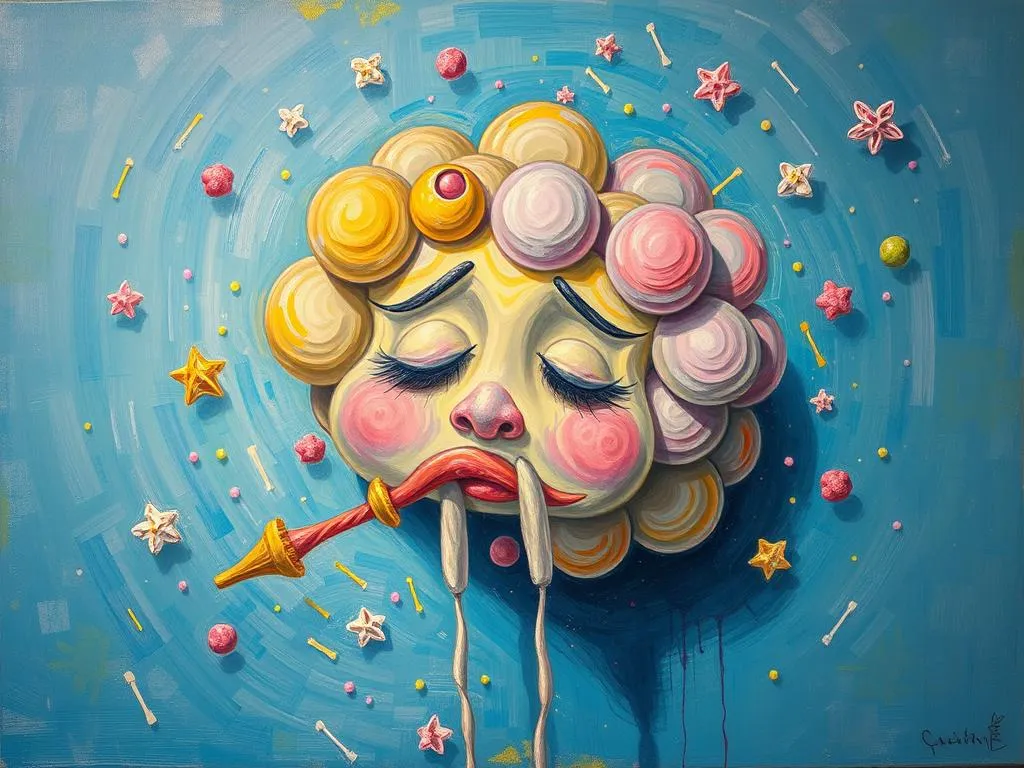
Introduction
Dreams have always held a fascinating place in human culture, often acting as a window into our subconscious minds. Among the myriad of dream themes, the sensation of choking stands out as particularly intense and distressing. This type of dream can evoke feelings of fear, helplessness, and anxiety, prompting individuals to question its significance. Why do we dream of choking? What does this troubling symbol reveal about our emotional and psychological states? Exploring the hidden meanings behind choking dreams can provide valuable insights into our waking lives and emotional well-being.
Symbolism and Meaning
At its core, the symbol of choking often represents feelings of suppression or being overwhelmed. This can manifest in various ways, reflecting deep-seated emotions that are struggling to surface. Choking may indicate that the dreamer feels unable to express themselves, whether due to external pressures, such as work or relationships, or internal conflicts, like self-doubt and fear of judgment. In this sense, the act of choking can symbolize the struggle for voice and the desire for authenticity in one’s life.
From a psychological perspective, choking dreams may also signify a fear of losing control, particularly in situations where the dreamer feels vulnerable. This can be related to personal relationships, career challenges, or even health issues. The choking sensation can be a manifestation of anxiety about not being able to cope with the demands placed upon them. It’s important to recognize that such dreams can vary greatly in symbolism depending on the context of the individual’s life.
Another layer of meaning can be found when considering the physical sensations associated with choking. The feeling of having one’s airway obstructed may reflect a sense of being trapped or cornered in real life. This could relate to a specific situation where the dreamer feels as though they cannot find a way out, whether it be in a toxic relationship, a stifling job, or even familial obligations. The dreamer’s subconscious mind may be urging them to confront these feelings of entrapment and seek paths to liberation.
Key Scenarios and Variations
The interpretation of choking dreams can shift dramatically based on the specific scenarios that unfold within them. For instance, if someone dreams of choking on food, this could symbolize feelings of guilt or anxiety related to nourishment and personal growth. The act of choking on something that is supposed to sustain life may point to an inability to accept what is nourishing or beneficial in one’s life. It could also highlight concerns around self-sabotage, where the dreamer unconsciously obstructs their own progress.
Alternatively, dreaming of someone else choking can evoke feelings of helplessness or fear of losing control over loved ones. In this scenario, the dreamer may feel an urgent need to protect or assist someone who is struggling, reflecting their emotional investment in that person’s well-being. This can serve as a prompt for self-reflection about their role in relationships and whether they are being supportive or overly protective.
The context of the choking incident also plays a crucial role in the dream’s interpretation. For example, dreaming of choking in a public setting may amplify feelings of embarrassment and exposure, highlighting fears of judgment or criticism from others. Conversely, if the choking occurs in a safe, private space, it might suggest a more internal struggle, possibly related to unresolved issues or emotions that the dreamer has yet to confront.
Another variation involves the presence of an unknown force causing the choking sensation. This might represent external stressors in the dreamer’s life, such as work pressures or social obligations that feel suffocating. The unknown element can symbolize a lack of control over these external factors, further emphasizing the dreamer’s feelings of powerlessness. It might also indicate a need to identify and address sources of stress in their life.
Real-Life Connections and Takeaways
Understanding choking dreams can offer significant insights into one’s emotional landscape. Reflecting on these dreams may encourage individuals to examine areas of their lives where they feel stuck, overwhelmed, or unable to express their true selves. This can be a powerful opportunity for self-reflection and growth.
One practical approach to connecting these dreams to real life is to keep a dream journal. By documenting not only the details of the dream but also the emotions felt during and after the experience, individuals can begin to identify patterns or recurring themes. This practice can facilitate a deeper understanding of the underlying issues that may be manifesting as choking sensations in dreams.
It’s also essential to consider the context in which these dreams occur. For instance, if a dreamer experiences choking dreams during a particularly stressful period, it may point to the need for coping strategies to manage that stress. Engaging in mindfulness practices, seeking professional support, or having open conversations with trusted friends or family members can help address these feelings of anxiety and suppression.
Furthermore, recognizing the symbolic nature of choking dreams can empower individuals to confront their fears. Instead of viewing these dreams solely as distressing experiences, they can be reframed as invitations to explore and address the emotions that lie beneath the surface. This proactive approach can lead to personal development, increased emotional intelligence, and a more profound sense of self-awareness.
Lastly, it’s vital for dreamers to remind themselves that dreams are often a reflection of their inner worlds rather than literal predictions or warnings. By embracing a more holistic view of dream symbolism, individuals can engage with their choking dreams as opportunities for growth, healing, and ultimately, liberation from the constraints that hold them back.
In conclusion, choking dreams can serve as powerful symbols of suppression, anxiety, and emotional struggles. By examining the various scenarios and personal connections tied to these dreams, individuals can gain valuable insights into their lives. Whether it’s through self-reflection, journaling, or seeking support, there are numerous ways to navigate the complex emotions associated with choking dreams. Ultimately, understanding the hidden meanings behind these distressing experiences can lead to greater self-awareness and personal empowerment.







